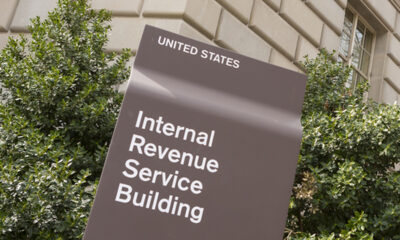NEWS
The Million-Dollar Myth: Retire Rich Without the Fortune
Published
4 months agoon

Shutterstock
Retirement doesn’t have to be a million-dollar dream. Many people believe that accumulating $1 million is the only way to retire comfortably, but this is a myth. With smart financial planning and realistic expectations, you can enjoy a fulfilling retirement without hitting that magic number. Let’s explore why you don’t actually need $1 million to retire and how you can make the most of your savings.
In this presentation, we’ll break down the reasons why the $1 million target is often overstated and provide practical tips on how to retire comfortably with less. From leveraging social security benefits to managing living expenses, there are multiple strategies that can help you achieve a satisfying retirement. By the end, you’ll have a clearer understanding of how to plan for your golden years without the stress of reaching a seven-figure savings goal.
Understanding Retirement Expenses

Shutterstock
One of the key aspects of retirement planning is understanding your actual expenses. Many people overestimate their needs by not considering how their spending habits will change. Without commuting costs, work-related expenses, and often lower housing costs, retirees can live comfortably on less. Evaluating your expected expenses can help you set a more realistic retirement savings goal.
Maximizing Social Security Benefits

Shutterstock
Social Security benefits can significantly reduce the amount you need to save for retirement. By understanding how benefits are calculated and the best time to start claiming them, you can maximize your monthly income. For many retirees, Social Security provides a stable and substantial portion of their retirement income, making it easier to retire without a massive nest egg.
Considering Healthcare Costs

Shutterstock
Healthcare is often a significant concern for retirees, but it’s possible to manage these costs effectively. Medicare and supplemental insurance plans can cover many expenses, reducing out-of-pocket costs. Planning for potential healthcare expenses and understanding your coverage options can help you avoid overestimating your retirement needs.
Downsizing and Simplifying

Shutterstock
Many retirees find that downsizing their home or simplifying their lifestyle reduces their financial needs. Moving to a smaller, more affordable home can significantly cut costs. Additionally, eliminating unnecessary expenses and focusing on what truly matters can make your retirement savings stretch further.
Part-Time Work and Side Hustles

Shutterstock
Continuing to work part-time or engaging in side hustles during retirement can provide additional income and a sense of purpose. Many retirees choose to pursue hobbies or freelance work that they enjoy, which can supplement their retirement savings. This additional income can reduce the pressure to save a large amount before retiring.
Investing Wisely

Shutterstock
Smart investing can help your retirement savings grow and last longer. By diversifying your portfolio and adjusting your investment strategy as you approach retirement, you can mitigate risks and maximize returns. Working with a financial advisor can help you create a plan that aligns with your retirement goals and risk tolerance.
Utilizing Retirement Accounts

Shutterstock
Retirement accounts like IRAs and 401(k)s offer tax advantages that can enhance your savings. Contributing regularly and taking advantage of employer matches can significantly boost your retirement funds. Understanding the benefits and rules of these accounts helps you make the most of your contributions.
Managing Debt Before Retirement

Shutterstock
Paying off debt before retiring can greatly reduce your monthly expenses. High-interest debts, such as credit cards and loans, can eat into your retirement savings if not managed properly. By focusing on becoming debt-free, you can enter retirement with fewer financial obligations and more peace of mind.
Creating a Retirement Budget

Shutterstock
A well-planned budget is crucial for managing your retirement finances. Knowing your income sources and expected expenses helps you stay on track and avoid overspending. Regularly reviewing and adjusting your budget ensures that you can maintain your desired lifestyle throughout retirement.
Exploring Affordable Living Options

Shutterstock
Exploring affordable living options can significantly impact your retirement budget. Many retirees choose to relocate to areas with a lower cost of living, which can make their savings go further. Researching and considering various locations can help you find a place where you can enjoy a comfortable retirement without high expenses.
Taking Advantage of Senior Discounts

Shutterstock
Senior discounts are available on a wide range of products and services, from travel to dining. Taking advantage of these discounts can help reduce your overall expenses. By actively seeking out and using senior discounts, you can stretch your retirement dollars further and enjoy more activities within your budget.
Staying Healthy to Reduce Costs

Shutterstock
Maintaining a healthy lifestyle can help you reduce medical expenses in retirement. Regular exercise, a balanced diet, and preventive healthcare can prevent costly medical issues. By focusing on your health, you can lower your healthcare costs and enjoy a more active and fulfilling retirement.
Embracing a Simple Lifestyle

Shutterstock
A simple lifestyle can lead to a more satisfying and financially secure retirement. Reducing unnecessary expenses and focusing on experiences over material possessions can make your savings last longer. Embracing minimalism and prioritizing what truly matters can enhance your overall well-being and financial stability in retirement.
Conclusion

Shutterstock
Retiring comfortably without $1 million is entirely possible with the right strategies and planning. By understanding your expenses, maximizing your benefits, and adopting a simpler lifestyle, you can achieve financial security. It’s important to focus on realistic goals and make informed decisions about your retirement. Remember, a fulfilling retirement is about enjoying your time, not just the size of your bank account.
Related Topics:

More From Financially+
-
Healthcare Workers Are Plagued By Financial Stress Amid Labor Shortages,…
-


16 Signs Someone Is Way More Broke Than They Seem
-


Beware: 10 Locations Where You Shouldn’t Plug in Your Phone
-


Universal Basic Income: 14 Reasons Everyone Deserves Free Money
-


Does Gen Z Spell The End Of The Republican Party?
-


19 Startling Reasons Why Moving to Texas Is Probably a…
-


IRS Introduces New Direct Filing System, Challenging TurboTax’s Market Leadership
-


17 Powerful Reasons You Should Make the Leap and Move…
-


23 Policies Democrats Would Relentlessly Enforce If They Had Unlimited…